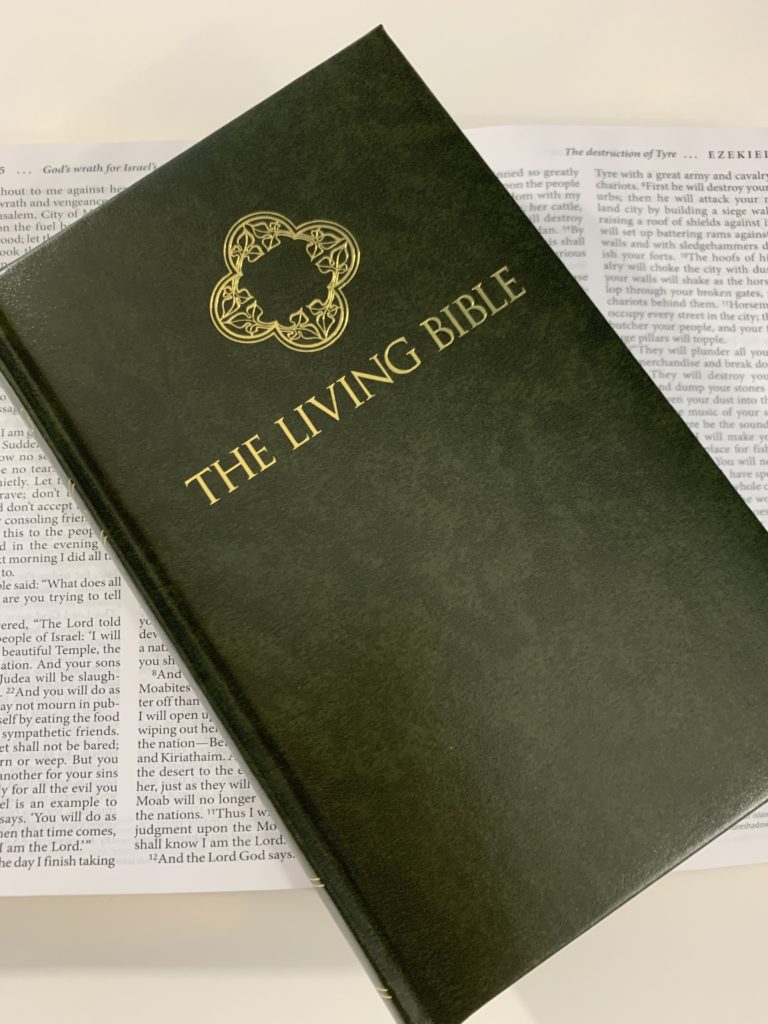This fall we are releasing the Daily Reader’s Bible. This Bible is a fresh way to read through the Bible in one year. There are no chapters and verses and the daily readings are grouped together by themes. We thought you would be interested to hear about this Bible from Blaine A. Smith, publisher for Bibles at Tyndale House Publishers.
by Blaine A. Smith, Bible Publisher, Tyndale House Publishers
Tyndale House Publishers started in 1962 as a small publishing company operating out of Dr. Kenneth and Margaret Taylor’s home in Wheaton Illinois. The only product in that humble beginning was entitled Living Letters – the epistles paraphrased by Dr. Taylor, primarily so that his ten children could better understand their nightly Bible readings. Dr. Taylor was passionate about making the Bible accessible for all people.

That passion, beginning with the publication of Living Letters eventually led to the publication of The Living Bible in 1971. This green padded hardcover paraphrase went on to be the best-selling book in the United States from 1973 through 1975!
Making the Bible accessible has been the clarion call for all Tyndale employees from the very beginning. The Living Bible continues to sell today with now over 40 million copies in circulation! The New Living Translation, a full translation of the Bible based on the work of over 90 Bible scholars has gone on to become the #3 Bible translation in the United States and has eclipsed The Living Bible in units sold since its introduction in 1996.
Now 58 years old, Tyndale House Publishers has become a leading Bible Publisher, not only in the United States, but around the world. We are always seeking fresh ways to engage people with the life-changing message of God’s Word and to encourage them in their Bible reading.

In 2010, Doug Knox, Senior Vice-President and Group Publisher, met with Klaus Krogh. From that very first meeting the spark of creativity fanned into flame. It was clear from the beginning that 2K/Denmark and Tyndale House Publishers shared a burning desire to make God’s Word accessible and to do so in a way that honored the Scriptures while forming the presentation to appeal to the modern reader.
This year that collaborative partnership will bring the Daily Readers Bible, in the New Living Translation, to the market in the English language. When Klaus first presented the concept to Doug Knox and Tyndale’s Bible Publisher, Blaine Smith, it was quickly apparent that the creative minds at 2K/Denmark had developed something truly unique – something that could rival Tyndale’s One Year Bible which has easily been the best-selling daily reading Bible since the concept was introduced in the 1980’s.

Tyndale’s Bible Acquisitions Director, Dave Thornton, stated “Most Christians want to read the Bible but when they set out to do that two key problems stand in their way. When they attempt a beginning-to-end reading of the Bible, they often bog down after the first 100 pages. The stories of Genesis and Exodus are fascinating, but as they begin moving into Leviticus and Numbers these two things pop up. First, they struggle to understand what’s happening and what it means, and second they can find some of the long lists, or detailed archaic laws boring. As a result, any Bible that helps people understand by connecting the dots throughout the full story of Scripture, and that groups the passages in such a way that daily readings vary throughout the different genres and testaments is quite helpful.”
Both Tyndale and 2K/Denmark clearly understood these challenges that a great daily reading Bible needs to address. Bibles have come and gone over the years, but one that could truly endure would have to be something very special indeed. Klaus and Johs Krehberg-Jahr set out to provide a daily reading Bible with a 4-part goal: 1 – structure the readings so that each reading related thematically for each day; 2 – provide a clear distinction between the different literary types of the Bible; 3 – control the length of time required of the reader each day; and, 4 – include every word of scripture without repeating any for the entire 365-days! Any one of these four goals on its own is a challenging task. Incorporating all FOUR into the same Bible is, well shall we say impossible? Or so we thought, when Klaus first described the project in 2017.

After a revisit to the drawing board, Klaus presented the concept in 2018 – the 2K team had pulled off the impossible! The Daily Reader’s Bible features the full text of the Bible without repetition in 365 daily readings (The Stories of the Bible, The Teaching of the Bible, and the Wisdom of the Bible). Each daily reading is uninterrupted by chapter numbers, verse numbers, section headings or textual notes. The daily theme helps the reader understand how the different sections of the reading support and complete the other. The innovative typesetting using 3-columns for the Stories section, 2-columns for the Teachings section and 1-column for the Wisdom section help the reader to clearly see transitions from one reading type to another and help the reader to develop a rhythm of daily reading. Each reading takes about 10-15 minutes per day. And here’s the bonus – 2K/Denmark’s type foundry developed fonts expressly designed for the challenges of Bible typesetting, resulting in imminently readable pages that encourage the reader to linger in God’s Word. The structure of the readings and the use of red-letter for the words of Christ, give the reader the sense that Jesus is speaking into their lives in nearly every daily reading.

Thornton said “The new Daily Readers Bible presents a fascinating approach to Scripture reading that links key themes of Scripture throughout the different genres and presents these texts in a visually fresh 3-2-1 column style unlike any other Bible on the market. We’re excited to present this fresh and visually stunning approach to 365 important thematic readings that help Christians accomplish the important goal of completing their plan to read through the Bible in a year.”
Our good friends at 2K/Denmark have helped us take another step forward in Dr. Taylor’s mission to make the Bible accessible – after all, it is who they are – and this shared, uncommon passion makes for a great partnership.
























Recent Comments